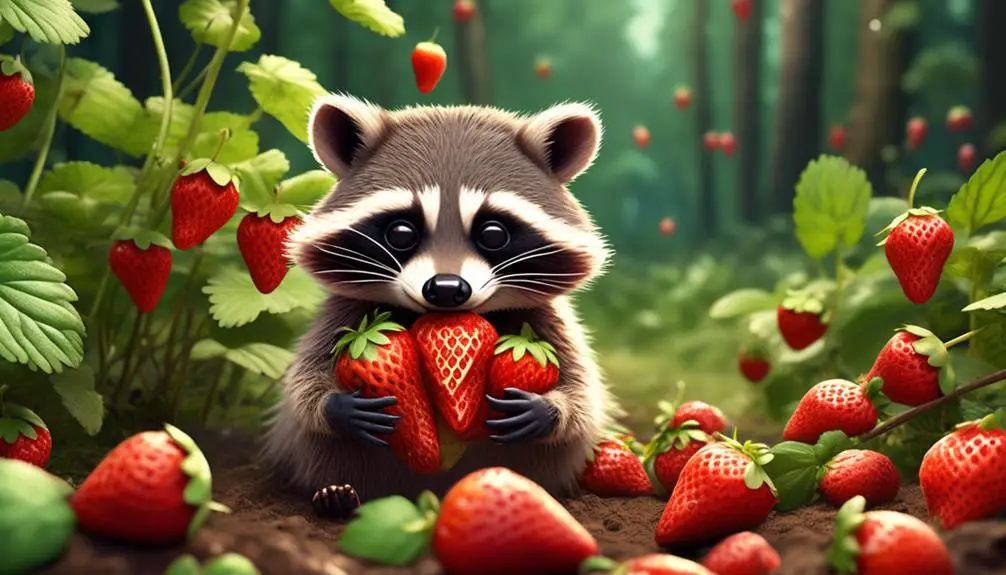Like a mischievous bandit sneaking into a garden, you might be wondering if raccoons have a penchant for devouring strawberries. Well, the answer might surprise you. These crafty creatures, known for their diverse diet and insatiable appetites, do indeed have a taste for the luscious red berries.
However, their love for strawberries can wreak havoc on your garden. But fear not, dear reader, for in this discussion, we will not only explore the fascinating eating habits of raccoons but also uncover effective strategies to protect your precious strawberry harvest.
So, get ready to discover the secrets of these cunning critters and gain valuable insights on safeguarding your garden from their strawberry-loving ways.
Raccoon Diet and Behavior
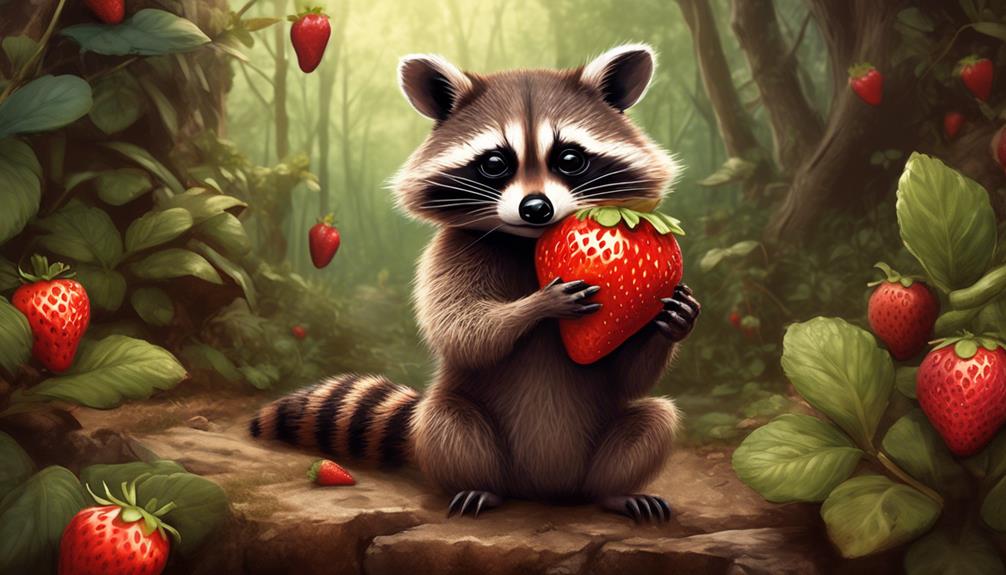
Raccoons, being omnivores and opportunistic feeders, have a diverse diet consisting of fruits, vegetables, insects, small mammals, and birds. Their diet is influenced by their ability to adapt to various environments. Raccoons have a preference for high-calorie foods, which provide them with the energy they need to survive. They’ve a keen sense of smell, allowing them to detect potential food sources from a distance. Additionally, raccoons are excellent climbers, which enables them to access fruits and birds’ nests in trees.
In terms of strawberries, raccoons are attracted to their sweet taste and aroma. This attraction can lead to damage to strawberry plants as raccoons forage for the fruit. They can eat multiple strawberries in one sitting, causing significant loss to gardeners. Moreover, raccoons may dig up strawberry plants in search of insects that may be hiding in the soil.
To protect strawberry gardens from raccoons, various strategies can be employed. Installing a fence or electric fence can deter raccoons from accessing the plants. Motion-activated sprinklers can startle raccoons and discourage them from approaching the garden. Applying repellents with strong odors, such as garlic or hot pepper, can repel raccoons. Harvesting strawberries promptly can also reduce the chances of attracting raccoons.
Understanding raccoon diet and behavior is essential for effectively managing and protecting strawberry gardens from their presence.
Raccoons and Strawberries
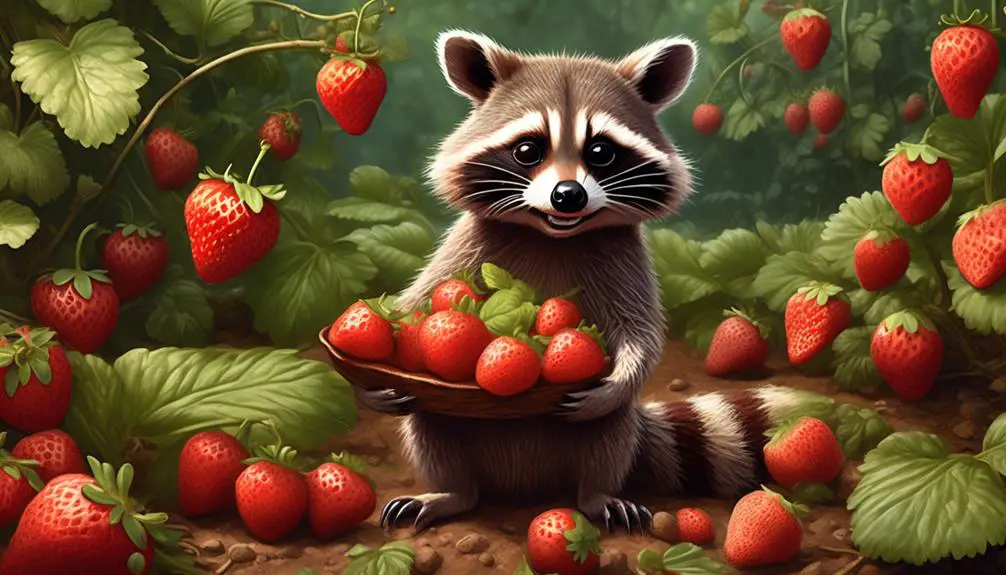
Raccoons are known to be attracted to the sweet taste and aroma of ripe strawberries, making them a potential threat to strawberry gardens. They may cause damage to the plants while foraging for the fruit and can consume multiple strawberries in one sitting, leading to significant loss for gardeners.
Their foraging behavior and impact on strawberry gardens highlight the need for effective strategies to protect crops from raccoon intrusion.
Strawberry Foraging Behavior
Strawberries, with their sweet taste and enticing aroma, often become the target of foraging behavior by opportunistic omnivores like raccoons. These clever creatures are attracted to the ripe fruit and can cause significant damage to strawberry plants while searching for their tasty treat. Raccoons have been observed to eat multiple strawberries in one sitting, leading to losses for gardeners. They may also dig up strawberry plants in search of insects, further impacting the garden. To protect your strawberry garden from raccoons, installing a fence or electric fence can be effective deterrents. Motion-activated sprinklers can startle raccoons and discourage them from approaching the garden. Applying repellents with strong odors, such as garlic or hot pepper, can also repel raccoons. Harvesting strawberries promptly can reduce the chances of attracting raccoons. Overall, understanding the foraging behavior of raccoons can help gardeners implement strategies to protect their strawberries and minimize damage.
| Strategies to Protect Strawberry Garden from Raccoons |
|---|
| – Install a fence or electric fence |
| – Use motion-activated sprinklers |
| – Apply repellents with strong odors |
| – Harvest strawberries promptly |
Impact on Strawberry Gardens
The presence of raccoons in strawberry gardens can have a significant impact on the overall health and productivity of the plants. Raccoons are attracted to the sweet taste and aroma of ripe strawberries, and they may damage the plants while foraging for the fruit. They’ve been known to eat multiple strawberries in one sitting, causing significant loss to gardeners.
Additionally, raccoons may dig up strawberry plants in search of insects, further impacting the garden’s productivity.
To protect strawberry gardens from raccoons, there are several effective strategies. Installing a fence or electric fence can be effective in deterring their access. Motion-activated sprinklers can startle raccoons and discourage them from approaching the garden. Applying repellents with strong odors, such as garlic or hot pepper, can also repel raccoons.
Harvesting strawberries promptly and implementing natural deterrents like planting strong-smelling herbs or using decoys can also help minimize raccoon damage.
Strawberry Garden Protection
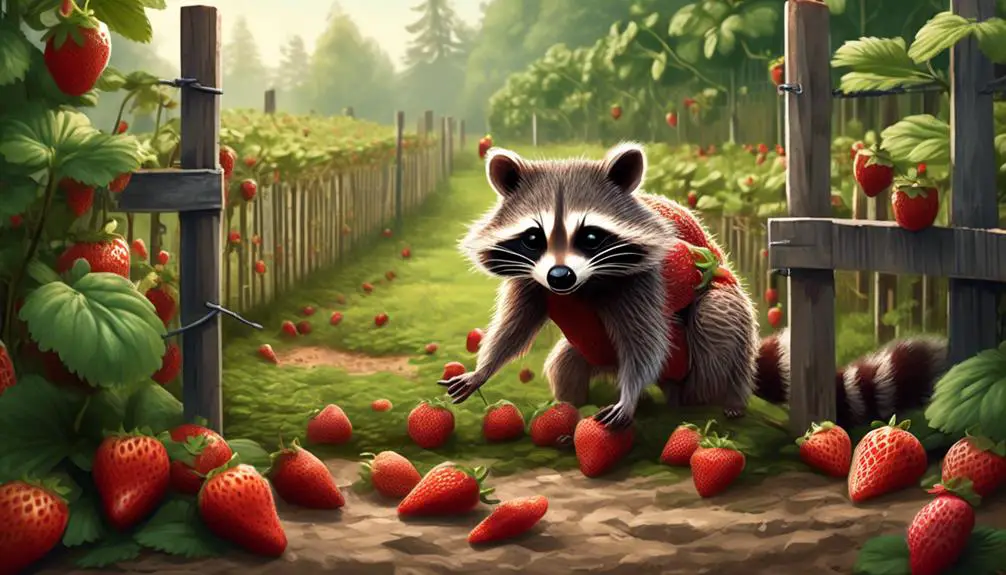
To protect your strawberry garden from raccoons, there are several effective methods you can employ.
Installing a fence or electric fence can create a physical barrier, preventing raccoons from accessing your strawberries.
Motion-activated sprinklers can startle raccoons and deter them from approaching your garden.
Using repellents with strong odors, such as garlic or hot pepper, can also help repel raccoons.
Fence Installation Techniques
One effective method for protecting your strawberry garden from raccoons is by installing a sturdy fence. Raccoons are skilled climbers, so a fence that’s at least four feet high and has a smooth surface can prevent them from accessing your strawberry plants.
Make sure the fence is buried at least six inches into the ground to deter raccoons from digging underneath. Additionally, it’s important to ensure that there are no gaps or openings in the fence, as raccoons can squeeze through small spaces.
Consider using materials such as wire mesh or chain link for the fence, as these are more difficult for raccoons to climb. Regularly inspect and maintain the fence to ensure its durability and effectiveness in deterring raccoons from your strawberry garden.
Motion-Activated Sprinklers
Motion-activated sprinklers serve as an effective deterrent for raccoons in protecting your strawberry garden. These innovative devices work by detecting the movement of raccoons and then releasing a sudden burst of water, startling the intruders and driving them away.
The motion sensors are highly sensitive and can detect even the slightest movement, ensuring that raccoons are quickly detected and deterred. By using this technology, you can effectively prevent raccoons from approaching your strawberry plants and feasting on your precious fruit.
The sudden spray of water not only startles the raccoons, but it also creates a negative association with your garden, making them less likely to return in the future. Motion-activated sprinklers are a humane and environmentally friendly solution to protect your strawberry garden from raccoon damage.
Repellents and Their Effectiveness
Using repellents is a common method for protecting strawberry gardens from raccoon damage. Repellents work by emitting strong odors that raccoons find unpleasant, deterring them from approaching the garden.
There are various types of repellents available, including commercial products and homemade solutions. The effectiveness of repellents can vary depending on factors such as the concentration of the active ingredient, the application method, and the persistence of the scent.
Some commonly used repellents for raccoons include garlic, hot pepper, ammonia, and predator urine.
It’s important to note that while repellents can be effective in reducing raccoon activity, they aren’t foolproof and may need to be reapplied regularly. Additionally, raccoons may become habituated to certain repellents over time, requiring the use of alternative methods for long-term garden protection.
Natural Deterrents
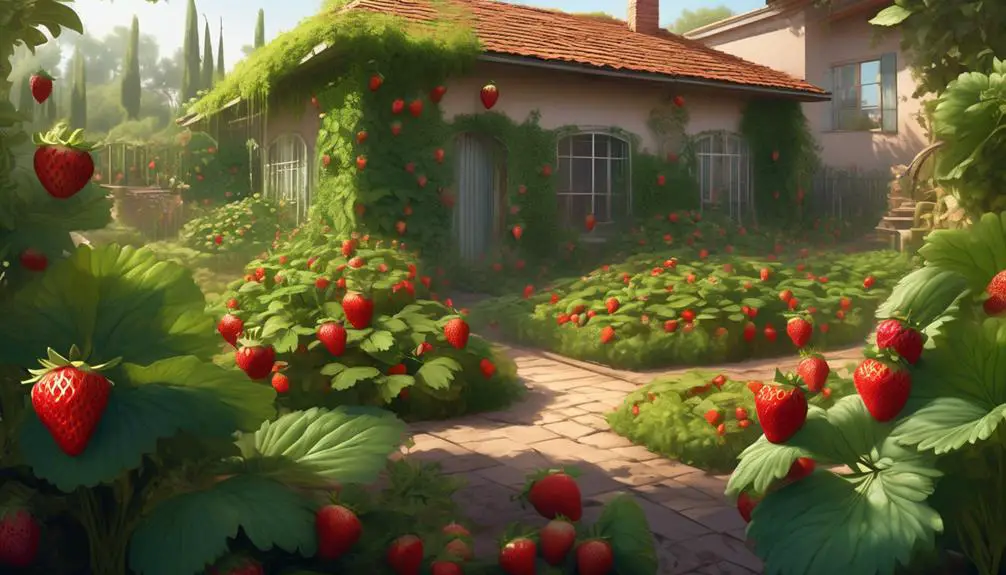
Raccoons can be deterred from accessing strawberry gardens by implementing various natural deterrent methods. One effective method is planting strong-smelling herbs like mint or lavender. The strong odors emitted by these plants can repel raccoons, as they have a sensitive sense of smell.
Placing fake owls or coyote decoys in the garden can also deter raccoons. Raccoons are intelligent creatures and can recognize potential threats. By placing these decoys, they may perceive the presence of predators and avoid the area.
Noise deterrents, such as wind chimes or radios, can make raccoons uncomfortable. Raccoons are nocturnal animals and rely on their hearing to detect potential dangers. The noises created by wind chimes or radios can disrupt their sense of security and discourage them from approaching the garden.
Another natural deterrent method is removing potential food sources from the garden, such as fallen fruits or garbage. By eliminating these food sources, raccoons are less likely to be attracted to the area.
Keeping the garden well-lit at night can also deter raccoons. Raccoons prefer dark and secluded areas, and a well-lit garden can make them feel exposed and less likely to visit.
Strawberries and Raccoon Health
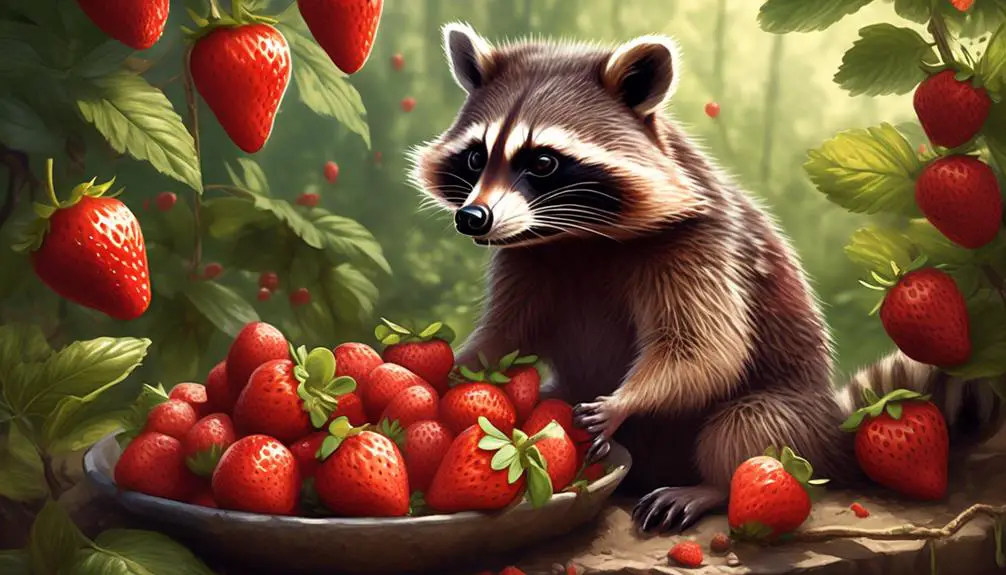
Strawberries play a significant role in the overall health of raccoons due to their nutritional content and potential exposure to pesticides or insecticides.
Raccoons are omnivores and opportunistic feeders, and they’ve a preference for high-calorie foods. The sweet taste and aroma of ripe strawberries attract raccoons, and they may damage strawberry plants while foraging for the fruit. Raccoons can eat multiple strawberries in one sitting, causing significant loss to gardeners.
Although strawberries aren’t toxic to raccoons, pesticide or insecticide remnants can be harmful. It’s important to properly wash strawberries to remove potential toxins. In moderation, strawberries can be healthy for raccoons as they contain vitamins and minerals that contribute to a healthy immune system. However, controlling the quantity of strawberries given to raccoons is crucial for their overall health.
As intelligent creatures, raccoons are highly adaptable and can thrive in urban environments. Gardeners can protect their strawberry gardens by installing fences or electric fences, using motion-activated sprinklers, applying repellents with strong odors, and harvesting strawberries promptly. Planting strong-smelling herbs, placing fake owls or coyote decoys, using noise deterrents, removing potential food sources, and keeping the garden well-lit at night can also help deter raccoons.
Attraction to Sweet Taste and Aroma
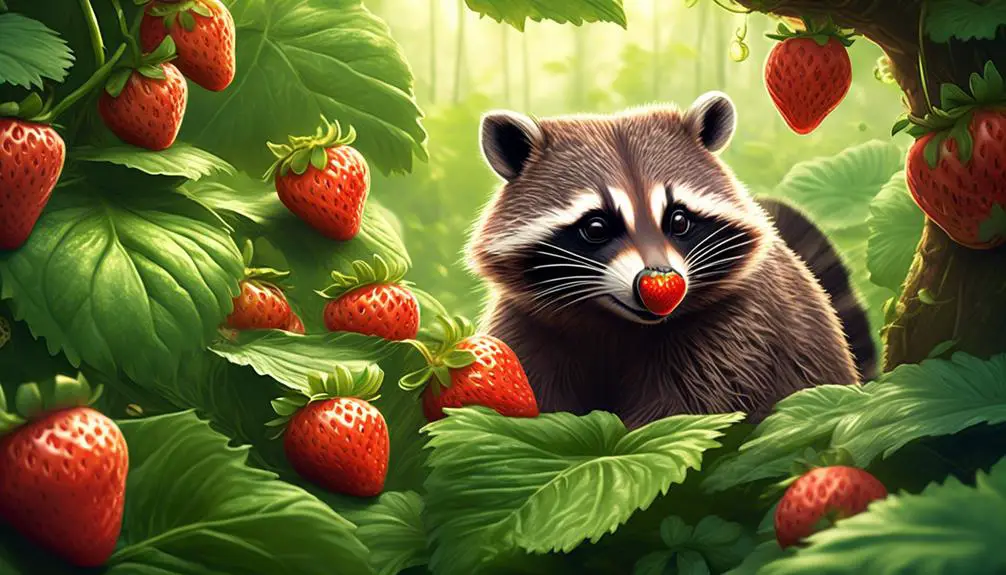
The irresistible allure of ripe strawberries lies in their sweet taste and aromatic fragrance, captivating the senses of these intelligent and adaptable creatures known as raccoons. Raccoons are omnivores with a preference for high-calorie foods, and their diet consists of fruits, vegetables, insects, small mammals, and birds. Their keen sense of smell allows them to detect the tantalizing aroma of ripe strawberries from a distance. This, coupled with their ability to climb, makes strawberry plants an attractive target for raccoons in search of a delicious treat. While foraging for strawberries, raccoons may cause damage to the plants and eat multiple strawberries in one sitting, resulting in significant loss for gardeners. They may also dig up strawberry plants in search of insects, further impacting the health and productivity of the plants.
To protect strawberry gardens from raccoon damage, gardeners can take several measures. Installing a fence or electric fence can deter raccoons from accessing strawberries. Motion-activated sprinklers can startle raccoons and discourage them from approaching the garden. Applying repellents with strong odors, such as garlic or hot pepper, can repel raccoons. Harvesting strawberries promptly can also reduce the chances of attracting raccoons. Additionally, planting strong-smelling herbs like mint or lavender can help deter raccoons from the garden.
Understanding the attraction of raccoons to the sweet taste and aroma of strawberries is crucial for implementing effective strategies to minimize damage and protect strawberry crops. By employing these methods, gardeners can coexist with raccoons and enjoy the fruits of their labor.
Damage to Strawberry Plants
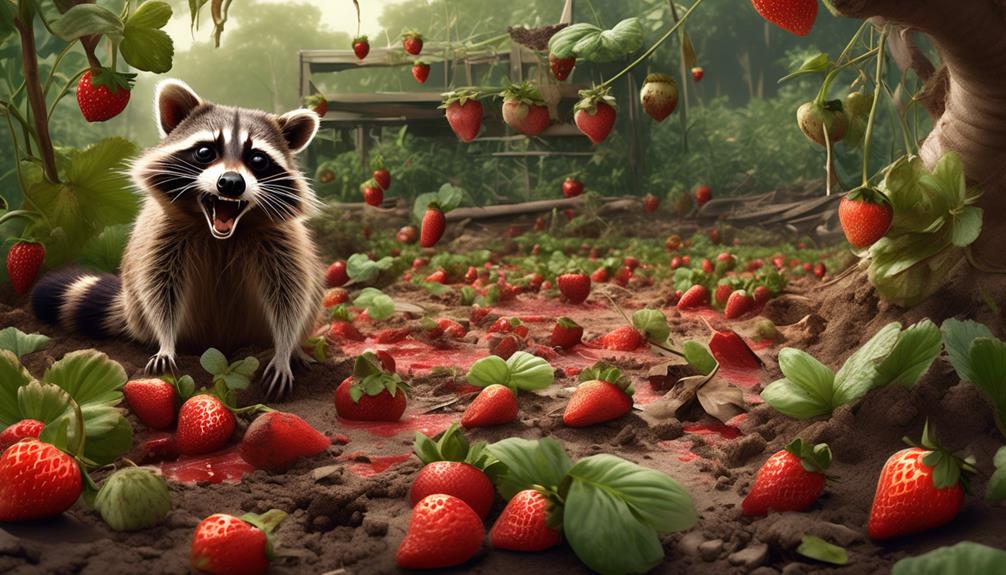
Raccoons have a tendency to cause damage to strawberry plants while foraging for the fruit.
Their foraging behavior can lead to the destruction of strawberry plants and result in significant loss for gardeners.
This includes eating multiple strawberries in one sitting and potentially digging up plants in search of insects.
Strawberry Foraging Behavior
During their foraging activities, raccoons can cause damage to strawberry plants as they search for the delicious fruit. Raccoons are attracted to the sweet taste and aroma of ripe strawberries, often leading them to feast on multiple strawberries in one sitting. This behavior can result in significant loss for gardeners. Additionally, raccoons may dig up strawberry plants while searching for insects that also inhabit the garden. To better understand the impact of raccoon foraging on strawberry plants, let’s take a look at the following table:
| Raccoon Foraging Behavior | Impact on Strawberry Plants |
|---|---|
| Eating ripe strawberries | Significant loss to gardeners |
| Digging up plants | Disrupts plant growth and root systems |
To protect your strawberry garden from raccoon damage, consider installing a fence or electric fence to deter them from accessing the plants. Motion-activated sprinklers can also startle raccoons and discourage them from approaching the garden. Applying repellents with strong odors, such as garlic or hot pepper, can repel raccoons as well. Remember to promptly harvest strawberries to reduce the chances of attracting raccoons to your garden.
Strawberry Plant Damage
Strawberry plant damage caused by raccoons can result in significant loss to gardeners. Raccoons are attracted to the sweet taste and aroma of ripe strawberries, which may lead them to damage the plants while foraging for the fruit. They can eat multiple strawberries in one sitting, causing considerable loss.
In addition to consuming the fruit, raccoons may also dig up strawberry plants in search of insects. To protect strawberry gardens, installing a fence or electric fence can deter raccoons from accessing the plants. Motion-activated sprinklers can startle raccoons and discourage them from approaching the garden. Applying repellents with strong odors, such as garlic or hot pepper, can also repel raccoons.
Promptly harvesting strawberries can reduce the chances of attracting raccoons.
Loss to Gardeners
The damage caused to strawberry plants by raccoons can result in significant loss for gardeners. Raccoons are attracted to the sweet taste and aroma of ripe strawberries, and they may damage the plants while foraging for the fruit. Their voracious appetite can lead to the consumption of multiple strawberries in one sitting, causing considerable losses for gardeners.
Additionally, raccoons may dig up strawberry plants in search of insects, further exacerbating the damage. To protect their strawberry gardens, gardeners can install fences or electric fences to deter raccoons. Motion-activated sprinklers can startle raccoons and discourage them from approaching the garden, while applying strong-smelling repellents like garlic or hot pepper can repel them.
Promptly harvesting strawberries can also reduce the chances of attracting raccoons. Overall, gardeners must take proactive measures to prevent raccoon damage and minimize their losses.
Strategies to Deter Raccoons
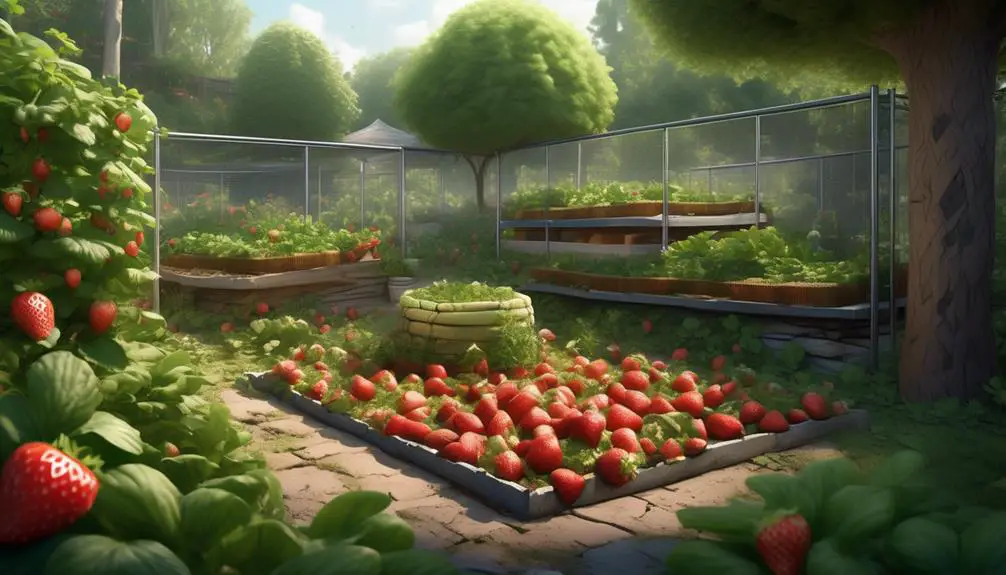
To effectively deter raccoons from your garden, implementing strategic measures is essential. Raccoons are intelligent creatures with a keen sense of smell and a preference for high-calorie foods. They can cause significant damage to strawberry plants while foraging for the sweet fruit. However, there are several strategies you can employ to protect your strawberry garden.
| Strategy | Effectiveness |
|---|---|
| Install a fence or electric fence | Highly effective |
| Use motion-activated sprinklers | Moderately effective |
| Apply repellents with strong odors | Moderately effective |
| Harvest strawberries promptly | Moderately effective |
| Plant strong-smelling herbs | Moderately effective |
| Place fake owls or coyote decoys | Moderately effective |
| Use noise deterrents | Moderately effective |
| Remove potential food sources | Moderately effective |
| Keep the garden well-lit at night | Moderately effective |
Installing a fence or electric fence is a highly effective measure to keep raccoons out of your garden. Motion-activated sprinklers can startle raccoons and discourage them from approaching. Applying repellents with strong odors, such as garlic or hot pepper, can also repel raccoons. Harvesting strawberries promptly reduces the chances of attracting raccoons. Planting strong-smelling herbs like mint or lavender can help deter raccoons as well. Additionally, placing fake owls or coyote decoys in the garden, using noise deterrents like wind chimes or radios, removing potential food sources, and keeping the garden well-lit at night can all make raccoons uncomfortable and less likely to visit.
Using Repellents With Strong Odors
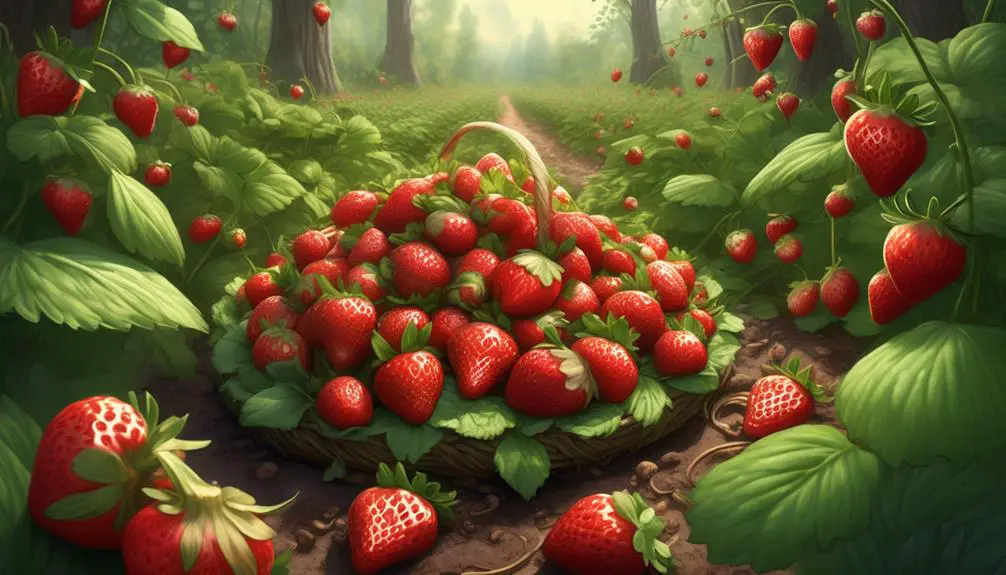
Using repellents with strong odors can effectively deter raccoons from your garden. Raccoons have a highly developed sense of smell, and certain odors can be overwhelming and unpleasant to them. By applying repellents with strong odors, such as garlic or hot pepper, you can create an environment that raccoons find unappealing.
The strong scent of these repellents can mask the sweet aroma of ripe strawberries, making your garden less attractive to these foraging creatures. Raccoons rely heavily on their sense of smell to locate food sources, so when faced with strong-smelling repellents, they’re more likely to seek out alternative food options elsewhere.
When using repellents with strong odors, it’s important to follow the instructions provided by the manufacturer. Applying the repellents directly on or around the strawberry plants can be effective in deterring raccoons. However, it’s crucial to reapply the repellents regularly, especially after rainfall or irrigation, as the scent can fade over time.
It is worth noting that while repellents with strong odors can be effective in deterring raccoons, they may also affect other animals or beneficial insects in your garden. Therefore, it’s essential to choose repellents that specifically target raccoons and don’t harm other wildlife. Additionally, it’s recommended to test a small area first to ensure that the repellent doesn’t cause any adverse effects on your plants.
Harvesting Strawberries Promptly
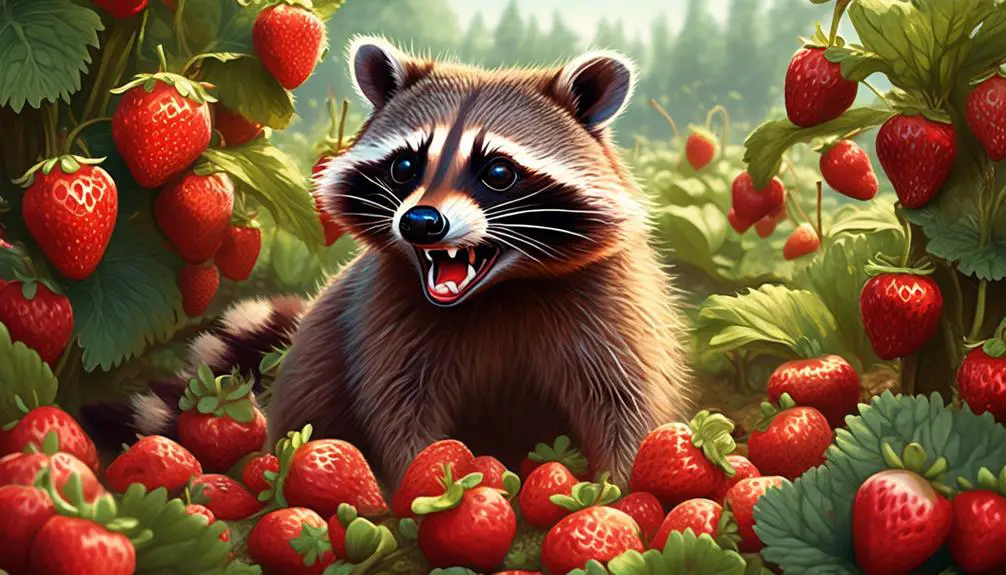
Harvest strawberries promptly to minimize the risk of attracting raccoons to your garden. Raccoons are attracted to the sweet taste and aroma of ripe strawberries, and they can cause significant damage to strawberry plants while foraging for the fruit. They’re known to eat multiple strawberries in one sitting, leading to substantial loss for gardeners.
Additionally, raccoons may dig up strawberry plants in search of insects. By harvesting strawberries promptly when they’re fully ripe, you can reduce the chances of attracting raccoons to your garden. This is because raccoons rely on their sense of smell to locate food, and the longer strawberries are left on the plants, the stronger the aroma becomes, making them more enticing to raccoons.
By removing the ripe strawberries from your garden as soon as they’re ready, you can minimize the risk of attracting these opportunistic feeders. Remember to handle the strawberries gently to avoid bruising or damaging them, as this can also attract raccoons.
Potential Health Risks for Raccoons
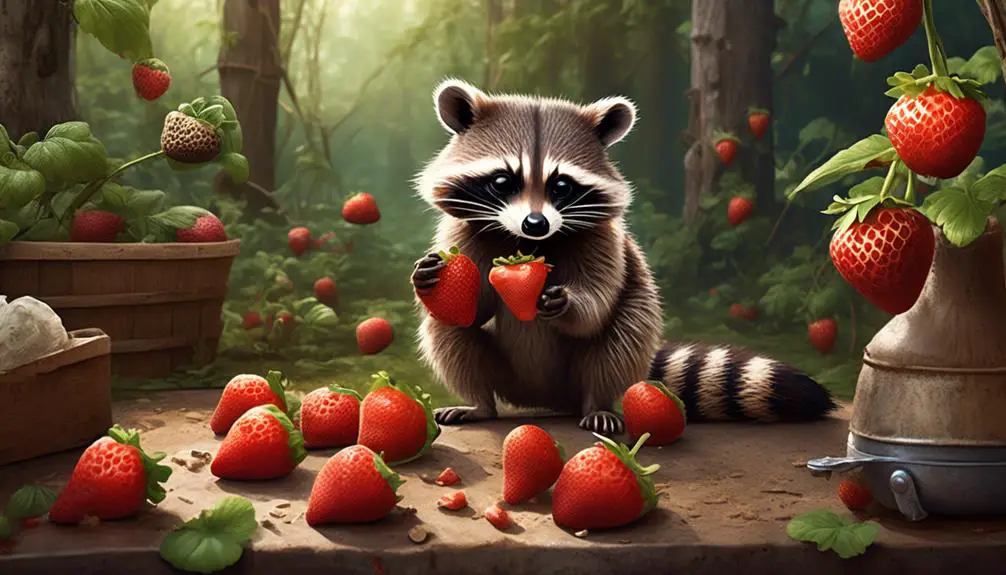
Raccoons can be exposed to potential health risks from pesticide or insecticide remnants on strawberries. While strawberries themselves aren’t toxic to raccoons, the chemicals used in their cultivation can pose a threat to their health. Pesticides and insecticides are commonly applied to strawberries to control pests and diseases. These chemicals can remain on the surface of the fruit even after washing, and if ingested by a raccoon, they can cause poisoning or other adverse effects.
The health risks for raccoons vary depending on the specific chemicals present on the strawberries. Some pesticides and insecticides can lead to neurological damage, respiratory issues, or gastrointestinal problems. Additionally, these chemicals can accumulate in the bodies of raccoons over time, leading to long-term health complications.
To minimize the potential health risks for raccoons, it’s important to practice proper washing techniques for strawberries. Thoroughly rinsing the fruit with water can help remove any pesticide or insecticide residues. Additionally, limiting the amount of strawberries given to raccoons can reduce their exposure to these chemicals.

Erzsebet Frey (Eli Frey) is an ecologist and online entrepreneur with a Master of Science in Ecology from the University of Belgrade. Originally from Serbia, she has lived in Sri Lanka since 2017. Eli has worked internationally in countries like Oman, Brazil, Germany, and Sri Lanka. In 2018, she expanded into SEO and blogging, completing courses from UC Davis and Edinburgh. Eli has founded multiple websites focused on biology, ecology, environmental science, sustainable and simple living, and outdoor activities. She enjoys creating nature and simple living videos on YouTube and participates in speleology, diving, and hiking.
🌿 Explore the Wild Side!
Discover eBooks, guides, templates and stylish wildlife-themed T-shirts, notebooks, scrunchies, bandanas, and tote bags. Perfect for nature lovers and wildlife enthusiasts!
Visit My Shop →
